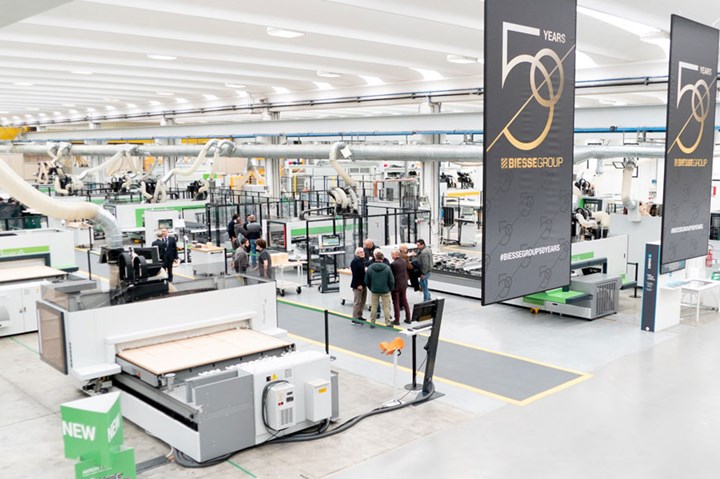Massivit 3D, Biesse Group sign technological agreement
The agreement facilitates the co-development of a new product line of hybrid manufacturing technologies for the automotive, marine, composite, construction and aerospace markets.
 Photo Credit: Massivit 3D
Photo Credit: Massivit 3DOn Nov. 2, Massivit 3D Printing Technologies Ltd. (Lod, Israel), a provider of large-volume 3D printing solutions, signed a technological and commercial partnership with multinational manufacturer of technology for wood, glass, stone, plastic and metal processing, Biesse Group (Pesaro, Italy), as part of a visit to Israel by Italian Foreign Minister, Luigi Di Maio.
The two companies aim to co-develop a new product line of hybrid manufacturing technologies for composite materials, as well as the automotive, marine, furniture, construction and aerospace sectors. These technologies, says Massivit 3D, will leverage its advanced, large-volume additive manufacturing technologies and Biesse’s broadly adopted subtractive manufacturing technologies.
By leveraging Biesse Group’s established commercial networks across multiple verticals, this mega distribution deal will enable Massivit 3D to markedly expand its market reach. Biesse Group operates through 39 branches with a customer base installed in 120 countries. It is publicly listed on the Italian Stock Exchange with a reported turnover of €706 million in 2019. The collaboration will also empower Biesse Group to partake in the 3D printing revolution that is escalating across a range of manufacturing industries.
“Today is the first step towards a new, profitable path towards innovation. Fundamentally, we aim to broaden our company’s boundaries and also our mental horizons,” says Roberto Selci, CEO of Biesse Group. “This opportunity has been brought to fruition by our internal expertise but also by our ability to look outwards and enable opportunities and solutions to flow freely via a two-way principle which forms the foundation of our Group Innovation Lab, Open-I.”
The agreement between Biesse Group and Massivit 3D initially emerged as part of Biesse Group’s Open-I project — what is said to be a dynamic Innovation Lab established to cultivate connections with other companies, universities, research centers, accelerators and venture capital firms in order to leverage digital transformation and Industry 4.0 advancements. Biesse Group says that it sought a new technology partner to diversify its manufacturing solutions, and the partnership was further initiated by financial service company, AdlerInlight’s, which identified technological and commercial synergies between the two companies.
“This partnership will enable us to deepen our penetration into new strategic markets owing to Biesse’s strong position in these arenas. It heralds in a new era for manufacturing by combining the best of additive and subtractive technologies to provide cost-effective, high-speed solutions for large-volume production,” adds Massivit 3D’s CEO, Erez Zimerman.
While Massivit 3D was unable to provide additional information regarding what composite-related hybrid manufacturing technologies will be facilitated, the company does acknowledge its next production line, the Massivit Tool Builder, which is designed to transform tooling for composite materials manufacturing by dramatically cutting down mold-production time and associated labor and costs. The technology is said to enable the mold shell to be printed in parallel with the casting material, solving the bottleneck of slow mold production time.
Related Content
-
Al Seer Marine, Abu Dhabi Maritime unveil world’s largest 3D-printed boat
Holding the new Guinness World Record at 11.98 meters, the 3D-printed composite water taxi used a CEAD Flexbot to print two hulls in less than 12 days.
-
Composites end markets: Boatbuilding and marine (2025)
As 2023-2024 consumer demand slows, boat and marine vessel manufacturers continue to focus on decarbonization and new technologies using composites.
-
MerConcept, Extracthive integrate rCF components into racing yacht construction
Development and integration of recycled composite ballast dorade vents for an IMOCA class yacht and other ongoing projects demonstrate a push for greater circularity in the marine industry.
















